ROAD TRAA MT TRAINING FACILITIES
Page 62
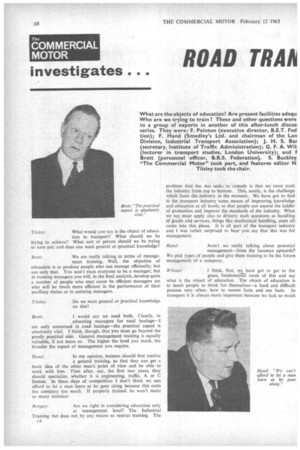
Page 63
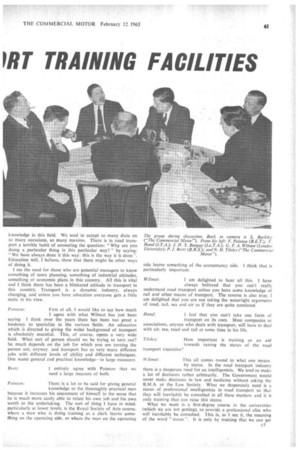
Page 64
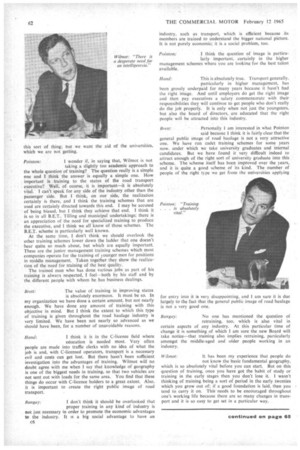
Page 67
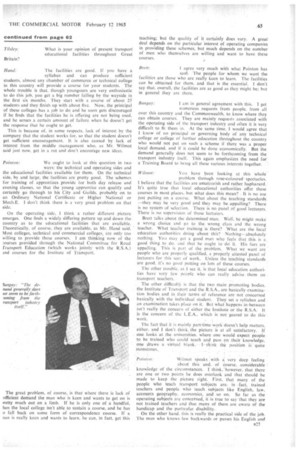
Page 68
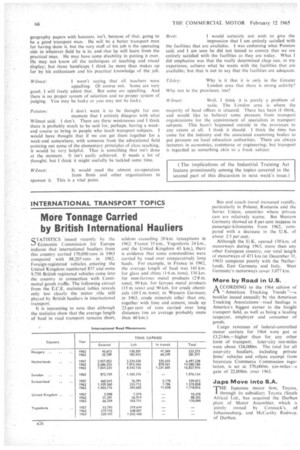
If you've noticed an error in this article please click here to report it so we can fix it.
What are the objects of education? Are present facilities adequ Who are we trying to train ? These and other questions were to a group of experts in another of this after-lunch discus series. They were: F. Pointon (executive director, B.E.T. Fed tion); F. Hand (Smedley's Ltd. and chairman of the Lon Division, Industrial Transport Association); J. H. S. Bar (secretary, Institute of Traffic Administration); G. F. A. Wil, (lecturer in transport studies, London University); and I Brett (personnel officer, B.R.S. Federation). S. Buckley "The Commercial Motor" took part, and features editor N
Tilsley took the chair.
What would you say is the object of educa tion in transport? What should we be trying to achieve? What sort of person should we be trying to turn out. and does one want general or practical knowledge?
Brett: We are really talking in terms of manage ment training. Well, the objective of education is to produce people who can manage efficiently; but not only that. You won't train everyone to be a manager; but in training managers you will, in the final analysis, develop quite a number of people who may never be efficient managers yet who will be much more efficient in the performance of their ancillary duties or in assisting managers.
Tilcley: Do we want general or practical knowledge
on this?
Brett: I would say we need both. Clearly, in
educating managers for road haulage—lam only concerned in road haulage—the practical aspect is absolutely vital. I think, though, that you must go beyond the purely practical side. General management training is equally valuable, if not more so. The higher the level you reach, the broader the aspect of management you require.
fland: In my opinion, trainees should first receive a general training, so that they can get a basic idea of the other man's point of view and be able to work with him. Then after, say, the first two years, they should specialize, whether it is engineering, traffic, A or C licence. In these days of competition I don't think we can afford to let a man learn as he goes along because this costs the company too much. If properly trained, he won't make so many mistakes.
Ban gay: Are we right in considering education only
al management level? The Industrial Training Act does not by any means so restrict training. The problem that the Act seeks to remedy is that we must train the industry from top to bottom. This, surely, is the challenge which faces the industry at the moment. We have got to find in the transport industry some means of improving knowledge and education at all levels, so that people can ascend the ladder of promotion and improve the standards of the industry. What we say must apply also to drivers; such questions as handling of goods and services, things like mechanical handling, must all come into this phase. It is all part of the transport industry and I was rather surprised to hear you say that this was for management.
Hand: Aren't we really talking about potential
management—from the foreman upwards? We pick types of people and give them training to be the future management of a company.
Wilmot: I think, first, we have got to get to the
grass, fundamenial roots of this and say what is the object of education. The object of education is to teach people to think for themselves—a hard and difficult process very often; how to mount facts and use facts. In transport it is always more important because we lack so much knowledge in this field. We tend to accept so many dicta on so many occasions, so many maxims. There is in road transport a terrible habit of answering the question: "Why are you doing a particular thing in this particular way?" by saying: "We have always done it this way: this is the way it is done ". Education will, I believe, show that there might be other ways of doing it.
I see the need for those who are potential managers to know something of town planning, something of industrial attitudes, something ot economic plans in this country. All this is vital and I think there has been a blinkered attitude to transport in this country. Transport is a dynamic industry, always changing, and unless you have education everyone gets a little static in his view.
Pointon: First ot all. I would like to say how much
I agree with what Wilmot has just been saying. I think over the years there has been too great a tendency to specialize in the various fields. An education which is directed to giving the wider background of transport is absolutely essential. This, of course, opens a very wide field. What sort of person should we be trying to turn out? So much depends on the job for which you are turning the person out, anyway. and transport has so very many different jobs with different levels of ability and different techniques. One wants general and practical knowledge—in large measures
Brett: I entirely agree with Pointon that we
need a large measure of both.
Pointon: There is a lot to be said for giving general knowledge to the thoroughly practical man because it increases his assessment of himself• in the sense that he is much more easily able to relate his own job and his own worth to the undertaking. The sort of thing I have in mind. particularly at lower levels, is the Royal Society of Arts course, where a man who is doing training as a clerk learns something on the operating side. or where the man on the operating
side learns something of the accountancy side. I think that is particularly important.
Wilniot: I am delighted to hear all this. I have always believed that you can't really understand road transport unless you have some knowledge of rail and other means of transport. The reverse is also true; am delighted that you are not taking the watertight arguments of road, rail, sea and air as if they are quite unrelated.
Hand: I feel that you can't take one form of
transport on its own. Most companies or associations, anyone who deals with transport, will have to deal with air, sea. road and rail at some time in his life.
Ti/sky: Elow important is training as an aid
towards raising the status of the road transport executive?
Wilmot: This all comes round to what one means by status. In the road transport industry there is a desperate need for an intelligentsia. We tend to make a lot of decisions rather arbitrarily. The Government would never make decisions in law and medicine without asking the B.M.A. or the Law Society. What we desperately need is a status of professional intelligentsia in road transport so that they will inevitably be consulted in all these matters: and it is only training that can raise thit status.
What we want is a first-degree course in the universities (which we are not getting), to provide a professional elite who will inevitably be consulted. This is, as I see it, the meaning of the word " status ". It is only by training that we can get Pointon: I wonder if, in saying that, Wilmot is not taking a slightly too academic approach to the whole question of training? The question really is a simple one and I think the answer is equally a simple one. How important is training to the status of the road transport executive? Well, of course, it is important—it is absolutely vital. I can't speak for any side of the industry other than the passenger side. But I think, on our side, the realization certainly is there, and I think the training schemes that are used are certainly directed towards this end. I may be accused of being biased, but I think they achieve that end. I think it is so in all B.E.T.. Tilling and municipal undertakings; there is an appreciation of the need for specialized training to produce the executive, and I think we all know of those schemes. The B.E.T. scheme is particularly well known.
At the same time, I don't think we should overlook the other training schemes lower down the ladder that one doesn't hear quite so much about, but which are equally important. These are the junior management training schemes which most companies operate for the training of younger men for positions in middle management. Taken together they show the realization of the need for training of the best quality.
The trained man who has done various jobs as part of his training is always respected, I feel—both by his staff and by the different people with whom he has business dealings.
Brett: The value of training in improving status is absolutely enormous. It must be so. In my organization we have done a certain amount, but not nearly enough. We have done any amount of training with this objective in mind. But I think the extent to which this type of training is given throughout the road haulage industry is very limited. We have been not nearly so advanced as we should have been, for a number of unavoidable reasons.
Hand: I think it is in the C-licence field where
education is needed most. Very often people are made into traffic clerks with no idea of what the job is and, with C-licensed operators, transport is a necessary evil and costs can get lost. But there hasn't been sufficient investigation into the advantages of training. Wilmot will no doubt agree with me when I say that knowledge of geography is one of the biggest needs in training, so that two vehicles are not sent out with loads for the same area. You find that these things do occur with C-licence holders to a great extent. Also, it is important to create the right public image of road transport.
Ban gay: I don't think it should be overlooked that
proper training in any kind of industry is not just necessary in order to promote the economic advantages to the industry. It is a big social advantage to have an c6 industry, such as transport, which is efficient because its members are trained to understand the bigger national picture. It is not purely economic; it is a social problem, too.
Pointon: I think the question of image is particu
larly important, certainly in the higher management schemes where you are looking for the best talent available.
Hand: This is absolutely true, Transport generally, particularly in higher management, has been grossly underpaid for many years because it hasn't had the right image. And until employers do get the right image and then pay executives a salary commensurate with their responsibilities they will continue to get people who don't really do the job properly. It is only when not just the youngsters, but also the board of directors, are educated that the right people will be attracted into this industry.
Brett: Personally I am interested in what Pointon
said because I think it is fairly clear that the general public image of road haulage is not a very attractive one. We have run cadet training schemes for some years now. under which we take university graduates and internal candidates. But we have found it very difficult indeed to attract enough of the right sort of university graduate into this scheme. The scheme itself has been improved over the years, and it is quite a good scheme of its kind. The number of people of the right type we get from the universities applying for entry into it is very disappointing, and I am sure it is due largely to the fact that the general public image of road haulage is not a very good one.
Bangay: No one has mentioned the question of
retraining, too, which is also vital in certain aspects of any industry. At this particular time of change it is something of which I am sure the new Board will take notice—that training also implies retraining, particularly amongst the middle-aged and older people working in an industry.
Wilmot: It has been my experience that people do not know the basic fundamental geography, which is so absolutely vital before you can start. But on this question of training, once you have got the habit of study or training in the early stages then you don't lose it. I wasn't thinking of training being a sort of period in the early twenties which you grow out of; if a good foundation is laid, then you tend to carry it on. This needs to be encouraged throughout one's working life because there are so many changes in transport and it is so easy to get set in a particular way.
Hand: The facilities are good. If you have a syllabus and can produce sufficient students, almost any chamber of commerce or technical college in this country will provide a course for your students. The whole trouble is that, though youngsters are very enthusiastic to do this job, you get a big number falling by the wayside in the first six months. They start with a course of about 25 students and they finish up with about five. Now, the prinscipal of these colleges has a job to do and Ile soon gets discouraged if he finds that the facilities he is offering are not being used, and he senses a certain amount of failure when he doesn't get the response that he ought to get.
This is because of. in some respects, lack of interest by the company that the student works for, so that the student doesn't get sufficient encouragement. It is also caused by lack of interest from the middle management who, as Mr. Wilmot said just now, get in a rut and don't encour-age new ideas.
Pointon: We ought to look at this question in two
ways: the technical and operating sides and the educational facilities available for them. On the technical side, by and large, the facilities are pretty good. The schemes for training of apprentices provide for both day release and evening classes, so that the young apprentice can qualify and certainly go through to his City and Guilds, probably on to an Ordinary National Certificate or Higher National or Mech.E. I don't think there is a very great problem on that side.
On the operating side, I think a rather different picture emerges. One finds a widely differing pattern up and down the country as to the educational facilities that are available. Theoretically, of course, they are available, as Mr. Hand said. Most colleges, technical and commercial colleges, arc only too willing to provide these courses. I am thinking now of the ..aourses provided through the National Committee for Road Transport Education (which works jointly with the R.S.A.) Ind courses for the Institute of Transport.
The great problem, of course, is that where there is lack of ufficient demand the man who is keen and wants to get on is iretty much out on a limb. If he is only one of a handful, hen the local college isn't able to sustain a course, and he has o fall back on some form of correspondence course. If a Ian is really keen and wants to learn, he can, in fact, get this teaching; but the quality of it certainly does vary. A great deal depends on the particular interest of operating companies in providing these schemes, but much depends on the number of men who themselves are willing and want to have these courses.
Brett: I agree very much with what Pointon has said. The people for whom we want the facilities are those who are really keen to learn. The facilities can be obtained for them, and that is the essential. I don't say that. overall, the facilities are as good as they might be; but in general they are there, Bangay: I am in general agreement with this. I get
numerous requests from people, from all over this country and the Commonwealth, to know where they can obtain courses. They are mainly requests associated with the operating side of the transport industry and often it is very difficult to fit them in. At the same time. I would agree that I know of no principal or governing body of any technical college or college of further education throughout the country who would not put on such a scheme if there was a proper local demand and if it could be done economically. But the demand generally does not seem to be forthcoming from the transport industry itself. This again emphasizes the need for a Training Board to bring all these various interests together. •
Wilmot: You have been looking at this 'whole
problem through rose-coloured spectacles. I believe that the facilities are amateurish and rather haphazard. It's quite true that local educational authorities offer these courses in most places. but what does this mean? It is no use just putting 'Ona course. What about the teaching standards -,—.they may be very good and they may be appalling? There is no system of selection. There is no. panel of good lecturers. There is no supervision of those lecturers.
Brett talks about the determined man: Well, he might make a wrong choice and go to the wrong class and the wrong teacher. What teacher training is there'? What are the local education• authorities doing about this? Nothing—absolutely nothing. You may get a good man who feels that this is a good thing to do. and that he ought to dci' it. His fees are appalling. This is part of the problem. What we want are people who are properly qualified, a properly attested panel of lecturers for this sort of work. Unless the teaching standar& . are good. it's no good platting on lots of these courses.
The other trouble. as I see it, is that local education authorities have very few people who can really advise them on transport teachers..
The other difficulty is that the two main promoting bodies. the Institute of Transport and the R.S.A., are basically examination bodies and in their terms of reference are not concerned basically with the individual student.. They set asyllabus and . an examination takes place on it. But what happens in-between isn't really the concern of either the Institute or the R.S.A. It is the concern of the LEA.. which is not 'geared to do this
work.
The fact that it is mainly part-time work doesn't help matters, either. and I don'tthink, the picture is at all satisfactory. If one looks at the universities, where one would .expect people. tp be trained who could teach and pass On their knowledge, one drawsa -virtual' blank. 1-,&rik the position is quite monstrous..
POilliOn: Wilmot speaks with a very deep feeling
about this and. of course. .considerable knowledge of the circumstances, I think, however, that there are one or two points he does overlook and that should be made to keep the picture right. First, that many of the people who teach transport subjects are. in •fact. trained teachers and people who teach subjects like English, law, accounts geography. economics, and so on. So far as the operating subjects are concerned, it is true to say that they are not trained teachers and that many of them are aware of the handicap and the particular disability. On the other hand. this is really the practical side of the job. The man who knows law backwards or passes his English and
geography papers with honours. isn't. because of that, going to be a good transport man. He will be a better transport man for having done it, but the very stuff of his job is the operating side in whatever field he is in. and that he will learn from the practical man. He may have some disability in putting it over. He may not know all the techniques of teaching and visual display; but those handicaps I think he more than makes up for by his enthusiasm and his practical knowledge of the job.
Wilmot: I wasn't saying that all teachers were appalling. Of course not. Some are very good; I will freely admit that. But some are appalling. And there is no proper system of selection and no proper system of judging. You may be lucky or you may not be lucky.
Pointon: I don't want it to be thought for one
moment that I entirely disagree with what Wilmot said. I don't. There are these weaknesses and I think there is probably much to be said for, perhaps, having a weekend course to bring in people who teach transport subjects. would have thought that if we can get them together for a week-end somewhere, with someone from the educational field pointing out some of the elementary principles of class teaching, it would be very helpful. That is something that isn't done at the moment. It isn't easily achieved. It needs a lot of thought; but I think it might usefully be tackled some time.
Wilmot: It would need the utmost co-operation
from firms and other organizations to sponsor it. This is a vital point.
Brett: I would certainly not wish to give the
impression that I am entirely satisfied with the facilities that are available. I was endorsing what Pointon said, and I am sure he did not intend to convey that we are entirely satisfied with the facilities as they are today. What did emphasize was that the really determined chap can, in my experience, achieve what he wants with the facilities that are available; but that is not to say that the facilities are adequate.
Tilsley: Why is it that it is only in the Greater
London area that there is strong activity? Why not in the provinces, too?
Well. I think it is purely a problem of scale. The London area is where the majority of head offices is situated. There has been (I think. and would like to believe) some pressure from transport organizations for the appointment of specialists in transport subjects. This hasn't happened outside in the provinces to any extent at all. I think it should. I think the time has come for the industry and the associated examining bodies to put pressure on local education authorities. There are always lecturers in economics, commerce or engineering; but transport is regarded as something akin to a freak subject.






























































































































